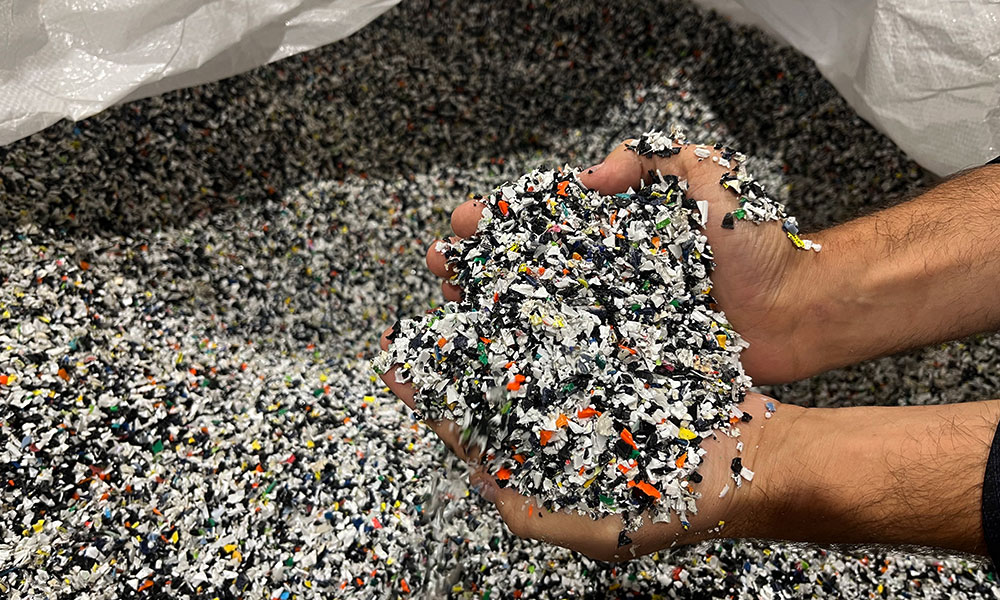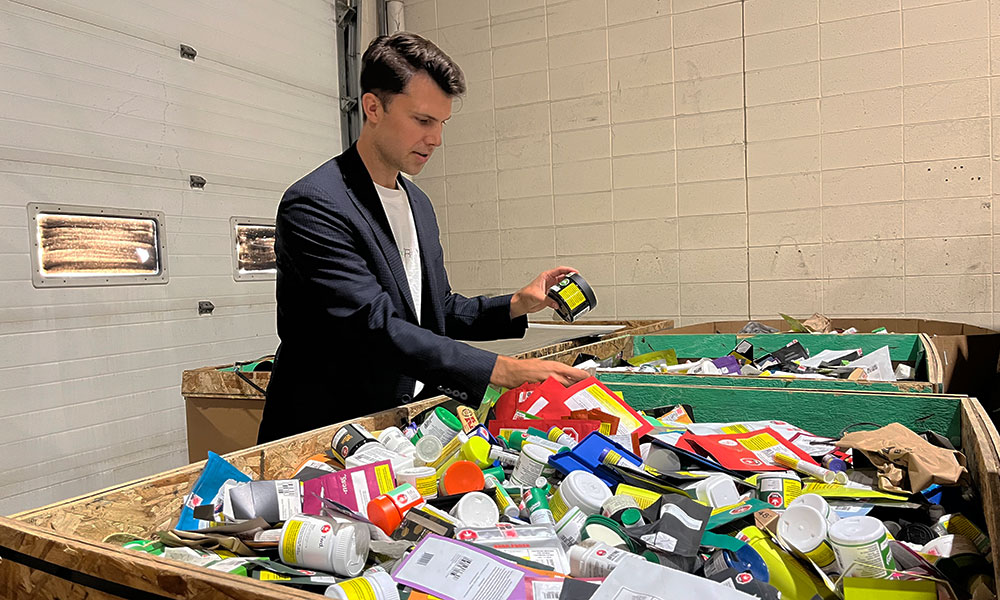NAIT and Clark Builders partner with [Re] Waste to validate technology that could change an industry
At the [Re] Waste facility in southeast Edmonton, mounds of plastic packaging are trucked in every week. On this day, several large bins filled with plastic jars and tubes from the cannabis industry wait to be sorted. And, outside, pallets piled with plastic bags from coffee retailers crowd the lot.
Most of that could easily end up in landfills, but Corey Saban’s burgeoning business is transforming that potential waste into marketable items.
“That’s where the gap is, because businesses don’t know that their waste can be turned into a product that they can use,” says Saban (Civil Engineering Technology ’13), [Re] Waste founder and CEO.
In 2022 alone, he says his company diverted more than 72 tonnes – or 72,000 kilograms – of waste from landfills, recently earning an Alberta Emerald Award for its work. But that’s just a fraction of the national tally. According to a recent report, Canadians discard more than 3 million tonnes of plastic waste every year. And only nine per cent of that gets recycled.
Now, Saban has teamed up with NAIT’s Applied Research department and Clark Builders, one of the country’s biggest general contractors, to help improve that stat within the construction industry, in which Saban worked for a decade.
“Just being on-site, you notice so much plastic … that would just end up in the dumpster,” says Saban.
After developing the [Re] Waste concept in 2020 following a layoff during the Covid pandemic, he approached NAIT and Clark Builders, a former employer, with a proposal to find a solution together. What they’ve come up with could help close that “gap” by decreasing the footprint of a traditionally carbon-intensive industry.
Plastic vs. plywood

[Re] Waste collects plastic waste – including materials that can’t be recycled through conventional programs – from retail, commercial and industrial businesses. Capitalizing on the opportunities presented by the growing circular economy, it then works with clients to develop tailor-made products using those recycled materials, which the businesses can then use or sell. In other cases, [Re] Waste funnels processed plastic flakes to other manufacturers.
The company, which has a staff of half-a-dozen, including Saban, now provides recycling services to hundreds of businesses in Canada and has even expanded to the U.S.
Saban says his company’s first commercially viable product was a rolling tray made from recycled cannabis packaging, created for the Value Buds chain. It has also produced plastic sheeting for the likes of Ikea and Nespresso.
[Re] Waste’s research with NAIT and Clark Builders builds on those innovations, looking at whether sheets made from recycled plastic could substitute for plywood in making formwork. During construction, formwork keeps concrete structures in place while they set. But plywood can only be used a few times at most before becoming damaged and ending up in landfills.
He wondered whether sheets made from recycled plastic could be used instead and, when damaged, be re-formed into new sheets. That would reduce the need for plywood, he says, diverting wood and plastic waste from landfills.
Construction of a large business development can require between 7,500 to 10,000 sheets of plywood that can be reused only a few times.
Construction of a large business development, for example, can require between 7,500 to 10,000 sheets of plywood that can be reused only a few times, says Aaron Sider (Carpenter ’12), a foreman with Clark Builders.
“Unfortunately, the majority of this material does eventually find its way to [the] landfill,” he says.
In seeking a solution, [Re] Waste has produced five types of sheets made from a variety of recycled plastics, about three to four millimetres thick. Saban partnered with NAIT so that researchers could evaluate them for chemical composition, strength and durability, as well as the ability to perform under a range of temperatures, says Kelsey Deutsch, an industrial surface chemist with NAIT’s Clean Technologies team.
“We’re also looking at the reuse-ability of these, because the idea would be to use them multiple times,” she says. The project is part of Plastics Research in Action, a collaboration between NAIT and Heartland Polymers aimed at identifying new ways to reduce plastic waste.
The top-performing plastic sheets will then be used to build sample concrete formwork at the NAIT lab. Students from the School of Skilled Trades will also participate in the concrete pouring as part of their hands-on learning, Deutsch adds.
From there, it’s on to field testing – expected to begin early in 2024 – to see how the plastic sheets stand up in the real world. Clark Builders’ sustainability manager, Adrienne Lynn (Construction Technology certificate ’12), says crews will likely trial plastic sheeting in one section of a construction site in the Edmonton area, while using traditional plywood in another section.
“The folks who have poured both sections can see the differences [in] how they’re performing when they remove the formwork [and] look at the quality of the finish,” she says. They’ll also assess how user-friendly the material is compared with plywood.
“It’s a super neat project,” Lynn says. “I’m excited to see where it goes.”
Sider says a new material that could be used indefinitely would go a long way in reducing the environmental impact of the construction industry.
“It would be amazing if this product was reliable and reusable,” he says. Field testing could also determine if plastic sheeting could save on construction costs as well.
Journey toward a solution

For Saban, the project is a milestone in a journey that began under difficult circumstances. As the pandemic hit, Saban says he was laid off as vice-president at a concrete company.
At home caring for three young children, while his wife, a physiotherapist, went to work, he was dismayed by the amount of single-use plastics his family accumulated.
“I think that really was the trigger to be like, why is there so much plastic waste?” Saban says. “Can’t we do something differently with it?”
That realization sparked a passion to find a solution. Saban began experimenting in his garage, melting single-use plastic bags between a clothes iron and a pancake griddle. At first, he produced zippered pouches made from potato chip packages, then made hand-pressed coasters out of other plastics, selling them online.
But he realized he had to scale up to become a viable business. A project for the City of Beaumont collecting plastics from residents and compiling data on the waste led to media exposure.
That, he says, caught the attention of Nova Cannabis, which operates the Value Buds chain. Working with the company to recycle its plastic waste was the turning point for [Re] Waste, allowing it to move out of his garage and into an industrial area.
Saban hopes the research at NAIT could lead to other changes in the construction industry. If plastic sheets can be used effectively in formwork, they might also have other applications, such as backing for cabinet doors or backsplash tiles, he suggests. And, he says [Re]Waste is now testing rock made from plastic as a replacement for aggregate used to make concrete.
“So, it’s really trying to be creative in how we can find other uses in the construction industry,” he says.
Lynn sees potential in that as well. If the current project is successful, she says [Re] Waste could use plastic waste from Clark Builders’ own construction sites to make the plastic sheets.
“That would be a big win for the construction industry,” she says.
“It would be super cool to tell [crews at] our next job site, ‘Hey, you know the plastic that’s in that formwork you’re using came from the job site you were on two months ago?’”